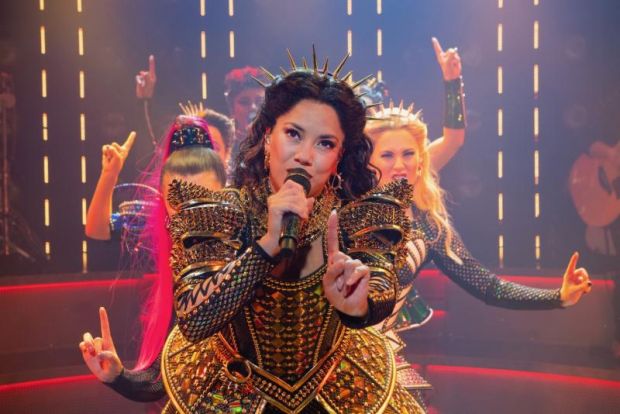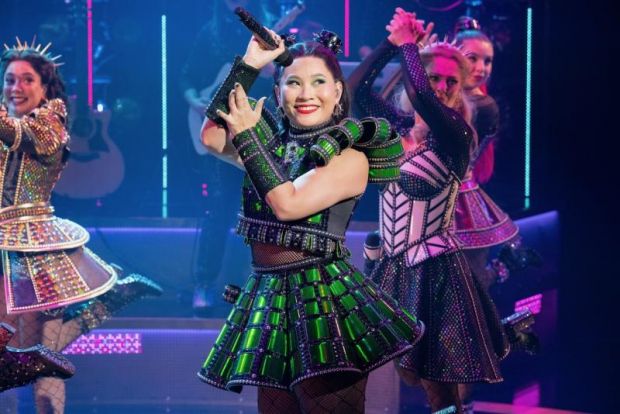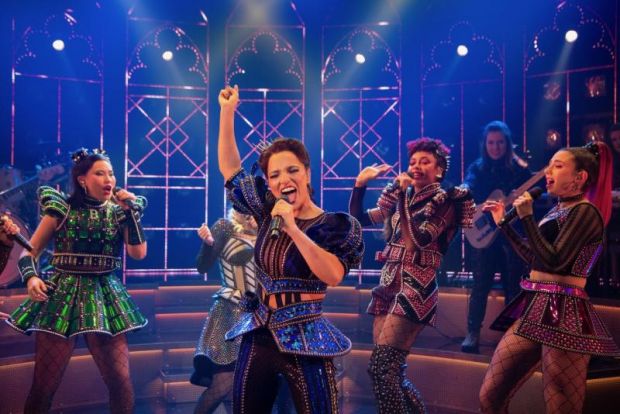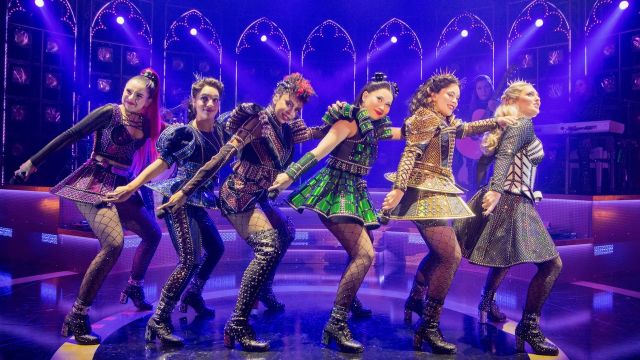Ten out of SIX
Coral Drouyn looks at the return of the hit musical SIX, speaking to Australian Associate Director Sharon Millerchip and the cast.
The chances of writing a smash hit musical before you turn 25 are about the same as finding Martians at the bottom of your garden. And yet that’s precisely what Toby Marlow and Lucy Moss did in 2017, during their last year at Cambridge (that is, wrote a smash musical. They haven’t commented on finding Martians, but it could still happen).
Against all odds, the young feminist dancer and the non-binary actor/composer put together a concept and then wrote an entire show in ten non-consecutive days in 2017 for the Edinburgh Festival that year … and history was made.
Well, to be honest, history made the show first. Moss, with a keen feminist attitude towards how woman have been falsely portrayed in history, watched a documentary series about Henry VIII’s six wives by Lucy Worsley, which attempted to set the record straight, while Marlow was more into the glamour and theatricality of the period itself. Nevertheless, she persuaded her friend and collaborator Toby that they should do more than just write a pop concert with some catchy tunes; they should actually say something about the undermining of the female gender in history. Toby agreed, as long as they could knock it over in fairly quick time. After all, it was just for the festival … it’s not as if many people were going to see it! And did it really matter that all most of us remembered about the wives of the obese king was how they met their ending at his hands?
Seven years and many millions of audience members later, the show continues to garner awards - 35 in all, including two Tonys - and accolades as well as criticism. While most praise its wit and unique style, the number one gripe seems to be from purists who don’t believe it is a musical at all, but rather a rock concert, which is what Marlow set out to write.
Torn between both viewpoints, I turned to Australia’s Associate Director of the show, Sharon Millerchip, for some clarification.
“It’s a hybrid, a new form of musical,” Sharon explains. “Much as we all loved Oklahoma! and the like in the forties, fifties and sixties, and Sondheim in the seventies, eighties and nineties, and ALW’s lavish spectacles, musical theatre has to keep evolving, has to keep offering the audience something new, or they will stop coming altogether.”
I wonder if that isn’t a somewhat cynical viewpoint, an excuse for the show to have no true storyline or raison d'être, but rather play on the rock concert theme. Sharon is quick to correct me.

“But it does have a story - it has all the elements of a traditional musical, they are just arranged and presented differently,” she parries passionately. “Think of it as a Trojan Horse. You recognize the shape, but you don’t know what it’s there for. You don’t see what is hiding inside until it is revealed to you, and by then you’re overwhelmed.”
Yes, there is a story in which six Queens, all married to the same despot King, vie with each other in competition to prove which of Henry VIII’s wives had the hardest time of it. So that’s round one to Sharon and the “SIX” camp. And it’s true that the six queens interact with each other and move forward because of that. But still, the music is full on, and where are the love songs? Those of us who remember our Tudor history from high school have a head start. Who, over the age of thirty, doesn’t remember the rhyme we all repeated to keep the order of wives fresh in our minds –‘Divorced, beheaded, dies, divorced, beheaded, survived.’ Trouble is, we still couldn’t remember which was which. It’s a difficult show and some of the cast have prior associations with earlier seasons. Chelsea Dawson (Katherine Howard) and Loren Hunter (Jane Seymour) are reprising their original roles and are joined by an astounding array of new talent.
Perhaps the six queens could explain it better.
Kimberley Hodgson – Aragon
“When we are learning history at school, especially focussing on people during this era, the historical recounts are most commonly from a male’s perspective. I made a conscious effort of sourcing material and audio books which analysed the life of the queens from a woman’s perspective, which I think empowers who they are/were and their legacy.”

Really? So the cast remembers what they learned at school? That seems unlikely for any show.
“We have our own intensive history course,” Millerchip tells me. “The first couple of days of rehearsal are just spent re-examining history. We cling to the old ideas of who women were in the 16th Century, and how they behaved. Yes, our heroines come from an era 500 years ago, but we wondered how they would be now, in this modern era. To do that we needed to explore who they were deep down and get rid of the idea that they somehow had no voice of their own. They did, and they used it loud and clear, and because of that they were made to suffer. The show doesn’t subvert history, it exposes and enhances it.”
Sharon is so passionate as she speaks that I can only think, “Well, that’s me told.” History was never like that in my day! Of course – Aragon was divorced, then ended up in a nunnery. Oh Henry!
Deirdre Khoo - Boleyn
“I grew up in Singapore, where they didn't actually cover the six wives of Henry VIII! (I know, how rude!). I've now learned, though, that these queens each had such detailed and rich stories that deserve to be told and honoured individually. Fun fact: Anne Boleyn was a musical gal! She sang and danced and played the lute.”

It’s interesting that Anne Boleyn had musical ability. Six of the finest vocalists you will ever hear on any stage make up the cast, but Millerchip insists it’s not a singing show “Our first auditions,” she tells me, “are always dance auditions. Six girls don’t leave the stage for 80 minutes and for all of that time they are dancing and singing. That takes enormous stamina and skill. Yes, they need great voices, but unless their dance skills are honed to perfection, they would never make it through those difficult numbers that involve intricate movement and highly skilled execution.”
Wow, and that doesn’t even include Anne Boleyn’s lute!

Loren Hunter – Seymour
'I didn’t learn about the queens in high school at all, but the story that sticks with me is that when Henry was courting Seymour he bought her a gift to ‘apologise’ for all the gossip around their ‘friendship’ at the time. It was a gift of gold sovereigns. Seymour refused the gift and said, ‘All I have is my honour, which for a thousand deaths I would not wound.’ I love that. Refusing a gift from the king is a bold move to say the least.”
So, Jane Seymour turned down Henry’s money? Is that an actual fact, I ask Sharon Millerchip. She’s adamant in her reply. “There’s enough research now to suggest that it is. Perhaps that’s why she is always seen as the one he truly loved. But each of our queens has a different tale to tell.”
Zelia Rose Kitoko - Cleves
“I learnt that my queen lived a very long life, and in her will she included all of her workers at the palace. She basically met the king on what you might call the blind date, which didn’t end up going so well, but was very savvy in the way that she managed to survive in the process and end up as one of the richest women in England at the time.”

But a show can’t be a history lesson.
Once again Sharon Millerchip disagrees. “Well, it can, as long as it is a lot of other things too. It’s funny, full of sophisticated wit, and stunning costumes, and it’s really about girl power. Let’s face it, everyone on that stage, including the band, is female, with all the strengths and weaknesses that we women have.”
Chelsea Dawson – Howard
“Honestly, I don’t remember learning anything about Tudor history but after being part of SIX for a few years now, I am constantly inspired by, and heartbroken for, these queens. Katherine Howard experienced a short tragic life, and it seems her life was used as a warning to younger women for how they should behave.”

By the time we get to Catherine Howard, the whole rock concert vibe starts falling into place, and it’s easy to imagine the queens swept away by a Superstar King … let’s say … Meatloaf. He isn’t with us anymore, but neither is Henry, and both of them were Superstars. But in the end, there’s always one woman left standing.
Giorgia Kennedy – Parr
“I never learned about Catherine Parr at school and I have had the best time diving head first into research about her (my Spotify playlist full of Parr and Tudor history podcasts is my current obsession!). Parr was a pioneer and a visionary; she was the first English queen to publish literature under her own name and was so proud of her work that she had a portrait painted of her holding her own book, which is just such a gorgeous image that I have in my head of her. She was an absolute radical thinker for the Tudor era: she prayed for a world where women could read and engage in scripture and politics in a meaningful way and believed in accessibility to education for women and commoners outside of court. I could write an essay on all that I love about Parr and find utterly fascinating about her, but I’ll leave it there. What a joy it’s been researching such a brilliant and nuanced woman.”

And what a joy to see such talent presented in such a refreshing setting and to hear a young audience screaming for encores after every song. Long may the six queens reign. And if they do, we won’t have to worry about the future of musical theatre at all.
Click here to read more about Musicals in Australia in 2025
Sydney – Theatre Royal - from 25 October 2024
Brisbane – Playhouse Theatre, QPAC - from 2 January 2025
Photographer: James D Morgan-Getty Images
Subscribe to our E-Newsletter, buy our latest print edition or find a Performing Arts book at Book Nook.

